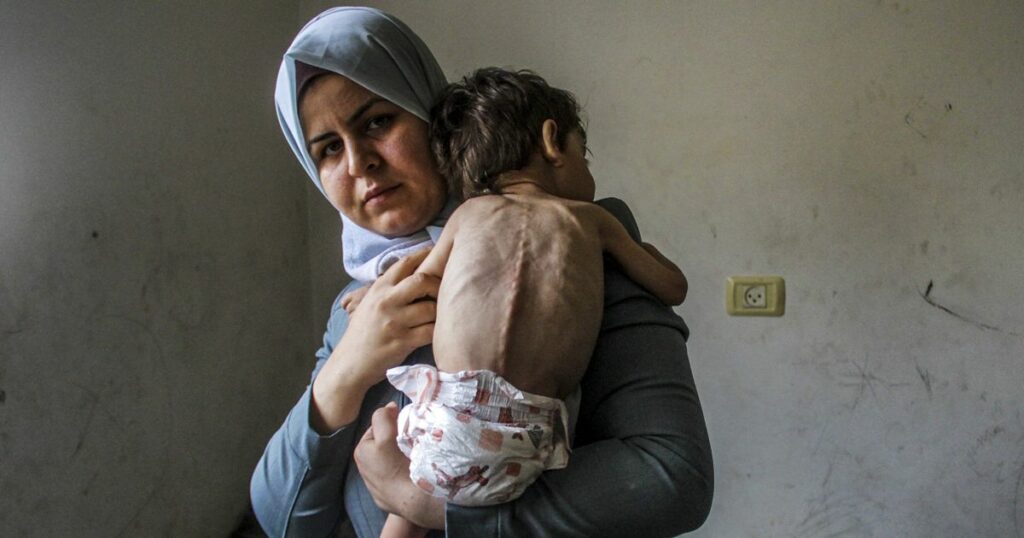Thousands of starving Palestinian children in southern Gaza are at risk of “dying before their families’ eyes,” according to the United Nations — a stark warning as Israel’s continued assault on Rafah cuts off access to the region’s health care facilities and life-saving treatment for malnutrition.
The nearly 3,000 affected children make up about three-quarters of the Palestinian youth in southern Gaza who were estimated to have been receiving care for moderate to severe acute malnutrition before Israel expanded its military offensive into Rafah, according to reporting from nutrition partners working with the United Nations Children’s Fund, or UNICEF.
“Horrific images continue to emerge from Gaza of children dying before their families’ eyes due to the continued lack of food, nutrition supplies and the destruction of healthcare services,” Adele Khodr, UNICEF’s regional director for the Middle East and North Africa, said in a statement on Tuesday.
“Unless treatment can be quickly resumed for these 3,000 children, they are at immediate and serious risk of becoming critically ill, acquiring life-threatening complications, and joining the growing list of boys and girls who have been killed by this senseless, man-made deprivation,” she continued.
Israel’s deadly military offensive in Gaza has entered its ninth month after Hamas militants attacked Israel on Oct. 7, killing about 1,200 people and taking about 250 hostages, roughly half of whom were released late last year. Since then, Israeli forces have killed more than 37,000 people — mostly women and children, according to the Gaza Health Ministry — displaced most of Gaza’s population, destroyed hospitals and blocked humanitarian assistance like food and clean water from entering the enclave.
“Numbers are numbing. Seeing this on the news over and over again, there is a kind of normalization that happens because people feel helpless,” Dr. Audrey McMahon, a pediatric psychiatrist who worked with Gaza’s children, told Doctors Without Borders. “But these children are human beings that have the same right to have a life lived in peace, to have access to good food, to grow healthy. They should have a right to have dreams and hope for the future.”
“Children are born where they’re born, and it doesn’t make them belong to any type of group,” she continued. “They are just children.”
Mahmoud Issa/Anadolu via Getty Images
Initially, images of child starvation in northern Gaza shocked the world as Palestinians grew desperate for humanitarian aid that was not arriving. Visibly emaciated babies and small children were shown clinging on to life while some families spoke of having to resort to eating animal feed and grass.
Humanitarian groups say that the aid situation has slightly improved in the north, but with Israeli forces still attacking Rafah and blocking major aid routes in the area, children in south and central Gaza are becoming malnourished, with virtually no access to proper health care.
Due to their metabolism, children are more susceptible to malnutrition, which leads to dangerously low blood sugar levels and stunts their growth, according to Dr. Tanya Haj-Hasan, a Doctors Without Borders pediatrician who has worked with Gaza’s youth.
“As adults, we need to eat so that we have energy, but our brains are fully developed. So if we are malnourished for some period of time, it’s very unlikely to impact our cognitive ability in the long term. Whereas in children, that’s not true at all,” she told the group earlier this month. “We know that starvation over time will eventually not only stunt the growth of their bodies, but also the growth of their brains and lead to developmental delays later in life and an inability to reach their full cognitive potential.”
Bashar Taleb/AFP via Getty Images
Recent malnutrition screenings in Gaza’s southern and central governorates show that cases of moderate and severe malnutrition have risen since the second week of May, when Israel’s assault on Rafah drastically cut off aid access, according to UNICEF.
Treating a malnourished child usually takes between six and eight weeks of uninterrupted care, the agency said, and requires special therapeutic food and formula — items that are rare at a time when Palestinians also face infection and disease due to collapsed water and health care systems.
“Malnourished children also have compromised immune systems. So a simple infection like a virus or a diarrheal illness that would be totally recoverable in a healthy person could actually lead to a malnourished child’s death,” Haj-Hasan told Doctors Without Borders.
“You end up in this vicious cycle where, as a consequence of recurrent bouts of diarrhea, illness and malnutrition, they have atrophy of the lining of their intestines, which affects their ability to absorb nutrients,” she continued. “So they have malabsorption, they lose more weight, their immunity’s worse, and it just keeps going until the child dies.”
Israel stands accused before the International Court of Justice of committing genocide against Palestinians, an allegation it and the U.S. have vehemently denied. Francesca Albanese, the U.N. special rapporteur for the region, published a detailed report earlier this year concluding that Israel’s actions against Palestinians, particularly since October, amount to genocide.
Related
Children gazastarvationmalnutrition
>>> Read full article>>>
Copyright for syndicated content belongs to the linked Source : The Huffington Post – https://www.huffpost.com/entry/thousands-starving-children-southern-gaza-care-unicef-israel-malnutrition_n_666a1865e4b076909e1cffe7
